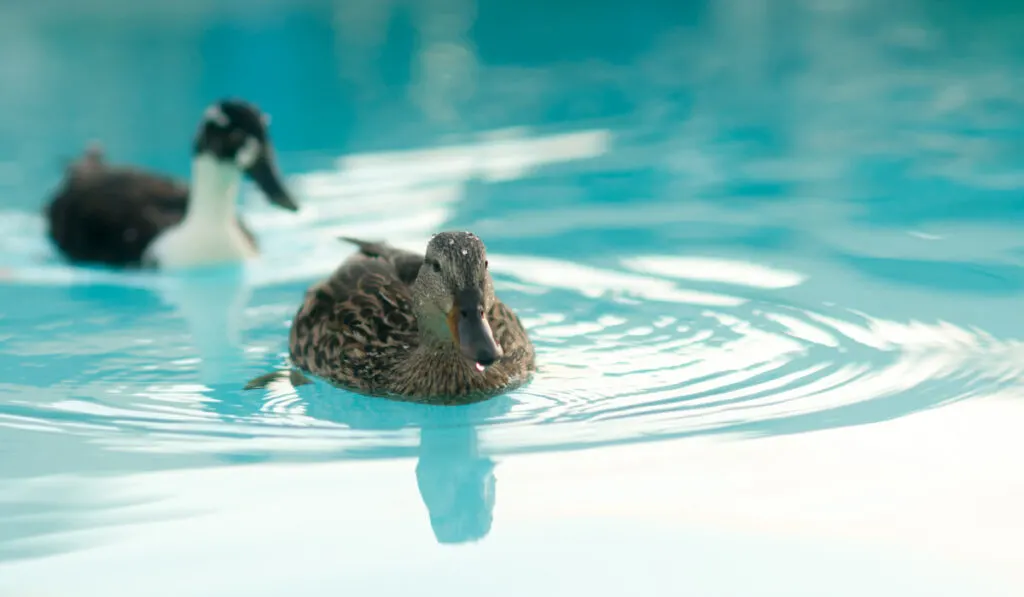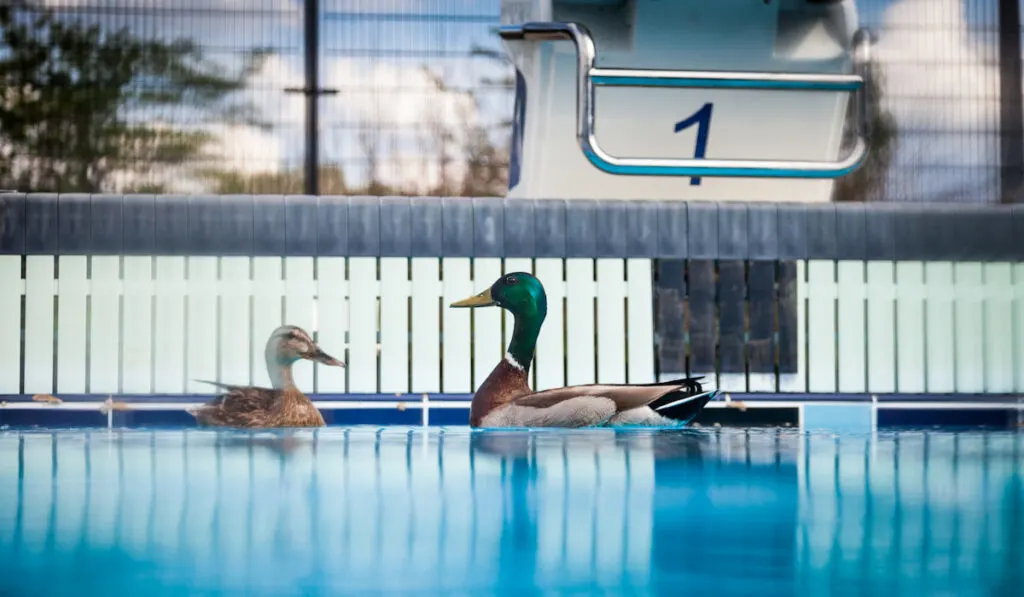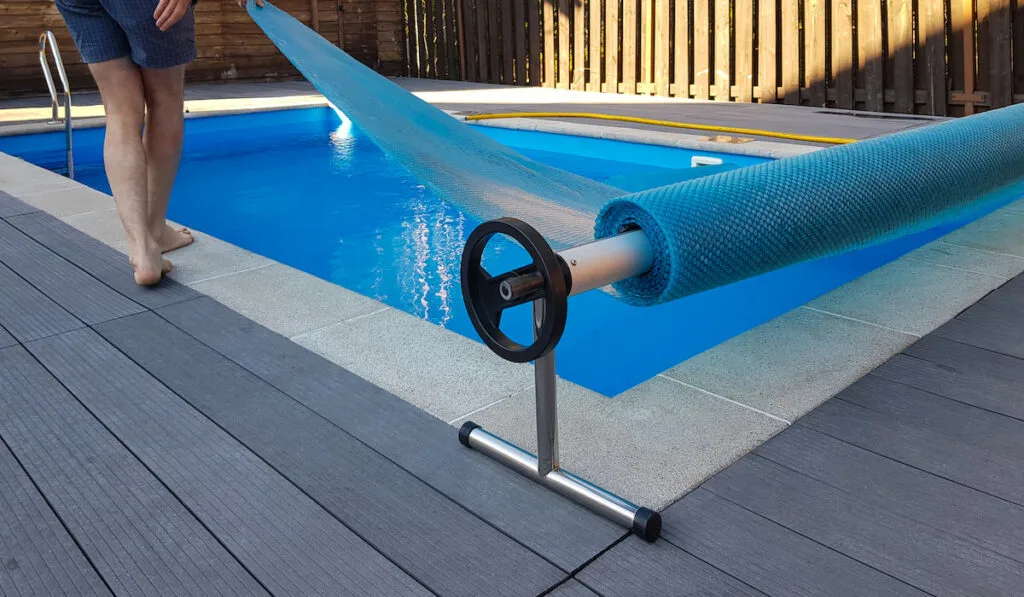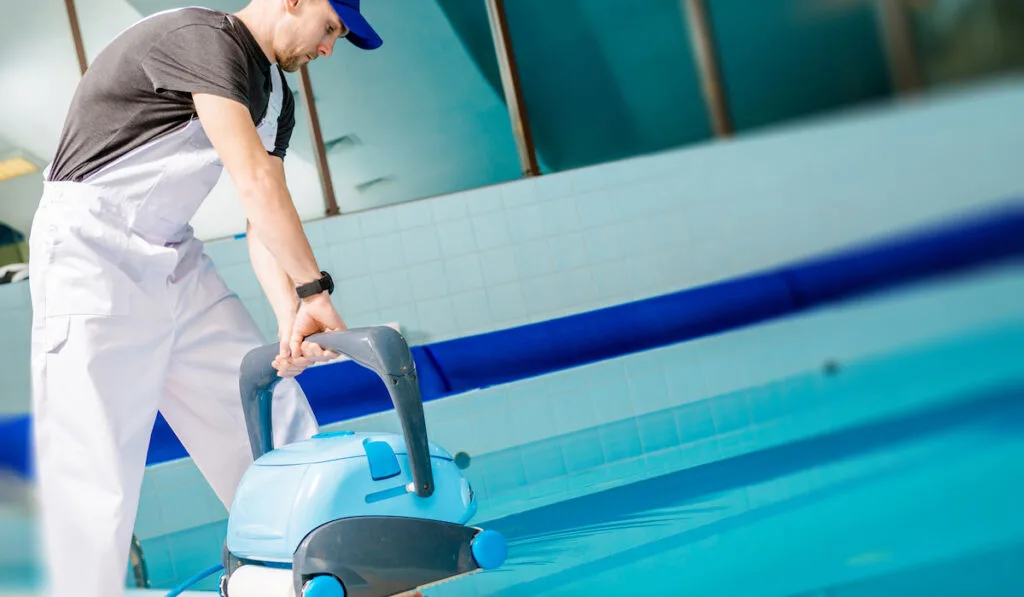Ducks are water lovers and are naturally attracted to water. If you are raising ducks or have some friendly neighborhood waterfowl, it’s only a matter of time before they will visit your swimming pool. But should you be worried about how the chlorine in your pool water can affect the ducks?
Are chlorine pools safe for ducks?
Swimming in a pool treated with chlorine will typically not harm ducks. However, ducks that ingest large amounts of the chemical can experience damage to their internal organs.

It is also important to note that duck poop can be harmful to humans when found in swimming pools. Duck poop can contain diseases that thrive in water. Continuing to treat your pool with chlorine, as directed, is key to ensuring a safe and fun environment for your swimming pool.
Let’s explore some factors to consider when ducks come into contact with chlorine water in swimming pools.
Table of Contents
Can Ducks Get Sick from Chlorine Water?
The amount of chlorine typically used to treat pool water is not considered harmful for ducks to swim in. However, ducks that drink large amounts of chlorine water can get sick from the chemicals that make it to their digestive tract. High levels (>25 ppm) can be harmful to ducks but rarely occur in well-maintained pools.

Can Chlorine Water Damage Duck Eggs?
After swimming, ducks typically fluff their feathers to remove excess water. Because their feathers are designed to help waterproof their bodies, much of the water and chlorine do not remain on the ducks.
Chlorine and other chemicals used to treat pool water can be damaging to duck eggs in large amounts. However, the very small amount of chlorine that remains on the duck when sitting on eggs after fluffing is not likely not make it through the egg shells or cause damage.
Can You Get Sick from Duck Poop in Your Pool?
Ducks carry different types of diseases that can affect people. Whey they defecate in your swimming pool water, you can easily get infected. You should continue to treat your pool using chlorine as directed by pool care professionals and the CDC in order to prevent exposure.

Duck droppings may contain Campylobacter, Salmonella, E. coli or Cryptosporidium. Cryptosporidium is the protozoa that causes diarrhea in humans and is resistant to chlorine treatment.
So while you should continue to treat your pool water, you should also try to prevent ducks from swimming in your pool. Not only will you protect yourself and your family, but you will also reduce the small risk that the ducks will also get ill.
Let’s take a look at some helpful ways to prevent ducks from swimming in your pool
5 Tips to Prevent Ducks from Swimming in Your Pool
Use Decoys to Scare Ducks Off
If ducks think there is a predator in the water, they will be less likely to spend time in it. Add a floating animal decoy to your pool to scare away waterfowl. The more realistic the floating decoy, the more likely it is to prevent ducks from swimming in your pool. Use full body decoys (not just a floating head) that have hinged motion for the best results.

Cover or Fence Your Pool to Keep Ducks Out
Using a pool cover when the pool is not in use can prevent ducks from exploring. A wide open pool with no one in it can look like a great place to swim to a duck. Adding a pool cover can deter ducks since the water will not be easily accessible.
Fencing your pool area can also help keep ducks out of your swimming pool. Consider using wire mesh so that ducks can’t squeeze in between fence posts and erect a gate for easy access.
Add a Motion Activated Sprinkler
Water sprinklers can startle ducks and safely scare them away from your pool. A motion activated sprinkler is also more eco friendly, only spraying water when needed. Sprinklers can be configured to shoot water in a specific direction with short, quick bursts.
Install an Automatic Pool Cleaner
Adding an automatic pool cleaner actually has two benefits: the surface and below water movement can scare ducks away, and your pool will be regularly cleaned. Ducks can be wary of unexpected motion as a defense against predators. An automatic pool cleaner moves slowly and is unlikely to hurt the animals but will still provide an effective startle.

Add a Surfactant
Surfactants change the surface tension by separating water molecules. Surfacants are typically used in pools to help push debris like pollen and leaves to the pool edges for easier clean up.
Since surfactants lower water surface tension, they also make it harder for ducks and other water fowl to float. The extra effort required for ducks to swim in this environment will not cause harm, but it will tire them out and make them more likely to leave the swimming pool.
Ducks are likely to be safe swimming in chlorine-treated water, but ingesting large amounts can be harmful. Duck poop is also harmful to humans. It is best for ducks to be deterred from swimming pools and to make sure that water is properly treated.
Resources
- https://cpoclass.com/ducks-swimming-pool/
- https://poolcareguy.com/how-to-keep-ducks-out-of-pool/
- https://patch.com/california/lagunaniguel-danapoint/swimming-with-ducks-can-be-hazardous-to-your-health
- https://www.quora.com/Can-ducks-swim-in-Chlorine-water
- https://www.ncbi.nlm.nih.gov/pmc/articles/PMC92971/
